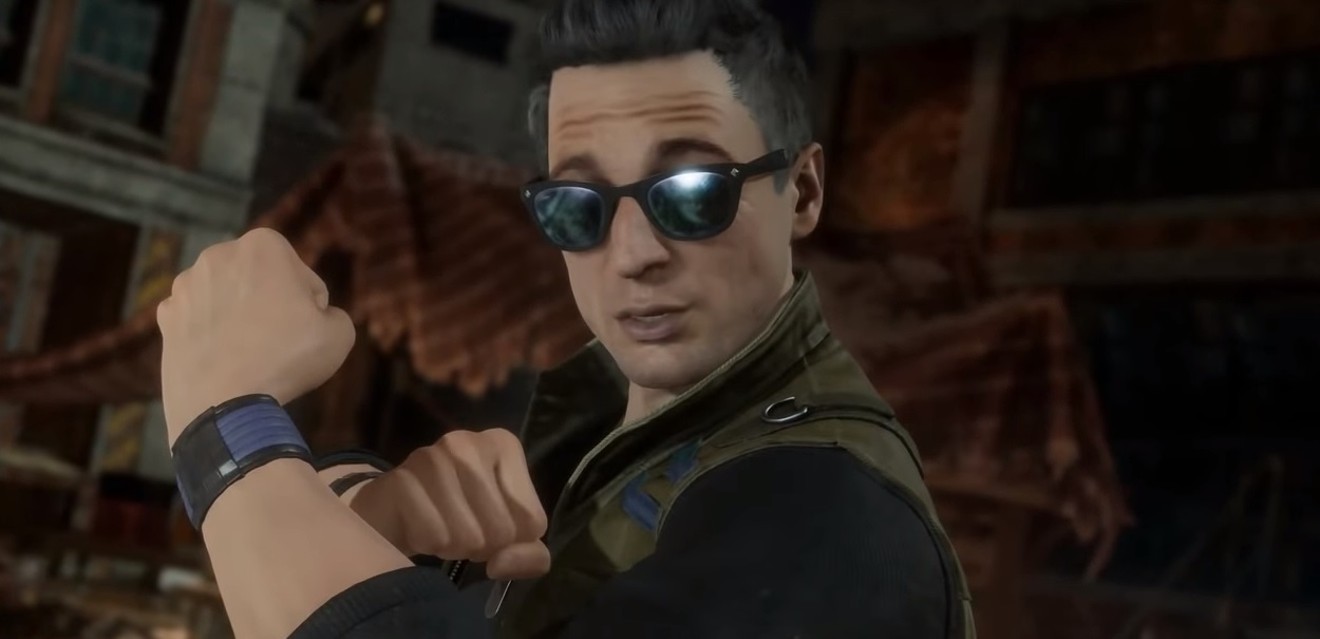Mortal Kombat 11 is due out on April 23 on all major platforms. The game is the third in the rebooted continuity and will feature an all new villain named Kronika, a first for the series in being a female main antagonist. The plot involves her attempting to fix the timelines that have been altered by Raiden, the thunder god protector of Earthrealm who has grown increasingly paranoid and despotic.
As with most fighting games, the lead up to the release is all about the character reveal trailers. NetherRealm Studios has been dripping out fighters over the last several weeks, showing off ones like Geras as well as returning warriors like Jade and Kabal. This week, we got Hollywood’s best martial artist and the man who beat the Elder God Shinnock in single combat, Johnny Cage.
Here’s the trailer. Content warning, there is swearing and gore.
The other thing that everyone loves about the Mortal Kombat release cycle is the chance to see new and gruesome fatalities. The bloody finishing moves are what made MK famous and even led to congressional hearings back in the day. Each trailer shows off a new one, but Cage’s also cements my favorite part of the series: he knows he’s in a video game.
The fatality is a variation on his first one from 1992, a simple uppercut that leads to a decapitation. It’s damn near tame after the last game a character turned into a building-sized meat grinder. Which is why Cage spices it up. The blow goes amiss, only removing the opponent’s lower jaw. Someone off camera yells “cut” and orders a retake. We get a shot of a clapboard with series co-creator Ed Boon listed as director, and Cage tries again with the same result. He curses and complains about his costar, but finally gets it right on the third take. Almost. The head sticks to his hand and he has to throw it at the screen to get it off him.
Mortal Kombat has always been kind of meta. The first game was half tongue-in-cheek creation after Boon and John Tobias failed to get the rights to make a game adaptation of Universal Soldier. Instead, they included Cage as a parody of Jean-Claude Van Damme. Since then, they’ve always had an eye on self-referential humor. Everything from the character Ermac to babalities to guest characters from horror movies has been a nod to the game’s famously engaged fanbase.
But the recent games have taken it to the next level. Johnny’s daughter Cassie Cage had a similar fatality in Mortal Kombat X. In that one she knocks off the jaw off opponents, and before they collapse she takes a selfie with them and posts it on social media. Many of the characters comment when she does so, such as her mother yelling at her about having her archrival Kano on her friends list and Liu Kang making lame jokes. Maximum internet realism is achieved when a rando doubts Cassie even killed someone, and Ed Boon makes an appearance under his actual Twitter handle to ask if anyone has unlocked the character of Fujin (who is not actually unlockable because Boon trolls his audience constantly).
Metatextual awareness, breaking the fourth wall, is something that art should do rarely and sparingly. Too much and you end up with characters who are too cool for their own vehicles, which is a problem Deadpool often falls into when handled badly. There’s winking at the audience and then there’s making fun of them for them for taking the experience seriously, sort of a post South Park jihad against the concept of narrative. That’s not something you should do lightly when you’re asking $60 for a game, more with DLC and season passes.
I think that it works in Mortal Kombat though because the idea that the characters know they’re in a video game actually clears up a problem with the series. The rebooted games have pioneered what I consider the best story mode in fighting games of the last decade. Their only rival to that title is the Injustice series, which is also made by NetherRealm. They combine the franchise’s rich mythology with modern game storytelling, and I legit watch the story modes as a two-hour movie on YouTube regularly.
It’s weird though because the games are famous for killing opponents and if you did that at every story beat you wouldn’t have any cast. There are some deaths on the story modes. Sindel murders a quarter of the roster at once in the 2011 game, and Mileena and Quan Chi are publicly executed in X. Thanks to shades from the afterlife being active combatants and some time travel - which is probably only going to get more ridiculous with the chronomancer Kronika - these people stay in the lineup, but fatalities in story mode are disabled specifically because killing at the wrong time would ruin the story. You can’t pull Raiden’s head off and then have him in the next scene. It would be stupid and ruin all suspension of belief.
The Cages use their fatalities to compartmentalize the murder, framing it as something that happens only in tournament play as opposed to within the narrative. Johnny’s exasperation with a guy who can’t get his head punched off correctly recalls Who Framed Roger Rabbit? when Roger gets dressed down because he can’t get stars to appear over him after a head injury and blows his line with tweeting birds. Cassie’s comment section reveals that the other characters consider fatal attacks to be no big deal, up to and including the person who she just killed some of the time.
Granted, it opens up a larger question regarding what the series says about violent content. Does death matter as the story mode would have us believe, or is all the murder meaningless, macabre fun without consequence? By existing in both realities as once, Mortal Kombat makes a subtle point about how the argument over gory content is an ongoing one even for the title most responsible for getting the discussion going a quarter of a century ago. The games are ever-more hyperbolically bloody, but the little bits of self-awareness remind players to step back and think about what it all means. We might laugh at the casual brutality of Cassie and Johnny, but the games knows what we’re doing and serves as a mirror to that reaction. It’s incredibly clever and oddly subtle, not labels usually applied to Mortal Kombat.
Support Us
Houston's independent source of
local news and culture
account
- Welcome,
Insider - Login
- My Account
- My Newsletters
- Contribute
- Contact Us
- Sign out
Mortal Kombat Characters Know They’re in a Video Game and it’s Awesome
Jef Rouner February 28, 2019 5:00AM

Prepare to get Caged!
Screencap from Youtube
[
{
"name": "Related Stories / Support Us Combo",
"component": "11591218",
"insertPoint": "4",
"requiredCountToDisplay": "4"
},{
"name": "Air - Billboard - Inline Content",
"component": "11591214",
"insertPoint": "2/3",
"requiredCountToDisplay": "7"
},{
"name": "R1 - Beta - Mobile Only",
"component": "12287027",
"insertPoint": "8",
"requiredCountToDisplay": "8"
},{
"name": "Air - MediumRectangle - Inline Content - Mobile Display Size 2",
"component": "11591215",
"insertPoint": "12",
"requiredCountToDisplay": "12"
},{
"name": "Air - MediumRectangle - Inline Content - Mobile Display Size 2",
"component": "11591215",
"insertPoint": "4th",
"startingPoint": "16",
"requiredCountToDisplay": "12"
}
,{
"name": "RevContent - In Article",
"component": "12527128",
"insertPoint": "3/5",
"requiredCountToDisplay": "5"
}
]
KEEP THE HOUSTON PRESS FREE...
Since we started the Houston Press, it has been defined as the free, independent voice of Houston, and we'd like to keep it that way. With local media under siege, it's more important than ever for us to rally support behind funding our local journalism. You can help by participating in our "I Support" program, allowing us to keep offering readers access to our incisive coverage of local news, food and culture with no paywalls.
Jef Rouner (not cis, he/him) is a contributing writer who covers politics, pop culture, social justice, video games, and online behavior. He is often a professional annoyance to the ignorant and hurtful.
Contact:
Jef Rouner
Trending Arts & Culture
- Whose Story is It in The Father at 4th Wall Theatre Co.
- Love is in the Alley's Charming Production of Brontë Classic Jane Eyre
- HGO's Don Giovanni Offers Sex, Deceit and a Final Reckoning All Wrapped Up in Mozart's Music
-
Sponsored Content From: [%sponsoredBy%]
[%title%]

Don't Miss Out
SIGN UP for the latest
arts & culture
news, free stuff and more!
Become a member to support the independent voice of Houston
and help keep the future of the Houston Press FREE
Use of this website constitutes acceptance of our
terms of use,
our cookies policy, and our
privacy policy
The Houston Press may earn a portion of sales from products & services purchased through links on our site from our
affiliate partners.
©2024
Houston Press, LP. All rights reserved.





